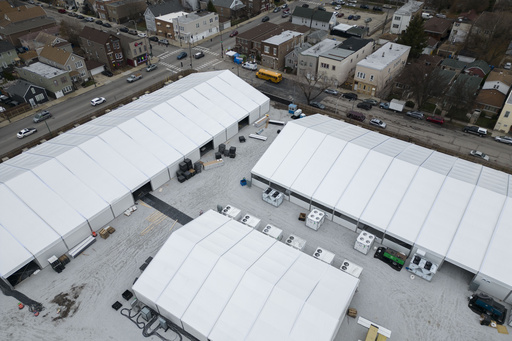Illinois halts construction of Chicago winter migrant camp

Construction of a government-run tent encampment for migrants is underway, Monday Dec. 4, 2023, in the Brighton Park neighborhood of Chicago. AP
SPRINGFIELD, Illinois — Gov. J.B. Pritzker’s administration halted construction Monday of a temporary winter camp for migrants in Chicago while the state reviews the removal of soil contaminants at the former industrial site.
The review, which a spokesperson for the governor said wouldn’t take long, comes with hundreds of migrants bused to the state from Texas over the past year still living inside of or in front of city police stations or at Chicago’s busiest airport.
The city released a study Friday from Chicago consultant Terracon that detailed the discovery and removal of sections of soil from the site in the Brighton Park neighborhood that contained higher-than-expected levels of mercury.
“Soil with mercury levels was identified at one location and was removed and properly disposed offsite at a landfill,” Mayor Brandon Johnson’s office said in a statement. “With the limited soil removal and placement and maintenance of the barrier, the site is safe for temporary residential use.”
The Illinois Environmental Protection Agency will review the testing, Pritzker spokesperson Jordan Abudayyeh said. The agency on Monday was speaking with Terracon about the work the company did at the site to determine whether it is safe for migrants to be temporarily housed there in winterized tent quarters, Abudayyeh said. She expected a decision very quickly.
The state put up $65 million for the tent camp in Brighton Park and for permanent structures at a site in the Little Village neighborhood. Together, they would house 2,200 migrants.
Some Brighton Park residents have protested against the plan for weeks, saying the zoning is improper and the ground is too contaminated.
The mayors of Chicago, Denver, Houston, Los Angeles and New York have been pressing for more federal aid to deal with the surge in asylum seekers. Migrants have been arriving in the Democrat-led cities on buses funded by the Republican governors of Texas and Florida. Critics initially waved off the effort as a political stunt, but more than a year later, the cities are struggling to cope with the influx and their resources are dwindling.
RELATED STORIES